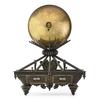Clock Runs Out on Trial of Antiquities Dealer
- January 31, 2012 12:12
A three-judge panel in Rome threw out the trial of American antiquities dealer Robert Hecht, 92, ruling that the statue of limitations on the alleged crimes had run out.
Accused of receiving artifacts illegally looted from Italy and conspiring to deal in them, Hecht was on trial for six years, concurrently with Marion True, the former curator of antiquities at the J. Paul Getty Museum in Los Angeles, who was indicted on similar charges. Her trial ended when the statue of limitations expired in 2010.
Hecht sold ancient treasures to museums around the world, including the Metropolitan Museum of Art.
His lawyer was dismayed that Hecht was not exonerated while the prosecutor, Paolo Ferri, was frustrated, saying that the Italian justice system was slow. "It is mortifying," said Ferri.
Since the Marion True trial, many museums have adopted more rigourous policies for researching the provenance of antiquities.
Several museums have also agreed with the Italian government to return contested antiquities. Notably, the Getty Villa in Malibu sent its prized "Cult Statue of a Goddess" back to Italy last year. Although the Getty never admitted wrongdoing in their purchase, Sicilian authorities contend the over 7-foot goddess, thought to represent Persephone or Aphrodite, was illegally excavated in the late 1970s. The museum had paid $18 million for the piece in 1988.
The Museum of Fine Arts, Boston, was the first American museum to have a dedicated Curator of Provenance, a full-time provenance research position now held by Victoria Reed, who studies the history of ownership of works currently in the MFA's collection and verifies clear title to new acquisitions.





100x100_n.jpg)
100x100_c.jpg)













100x100_c.jpg)